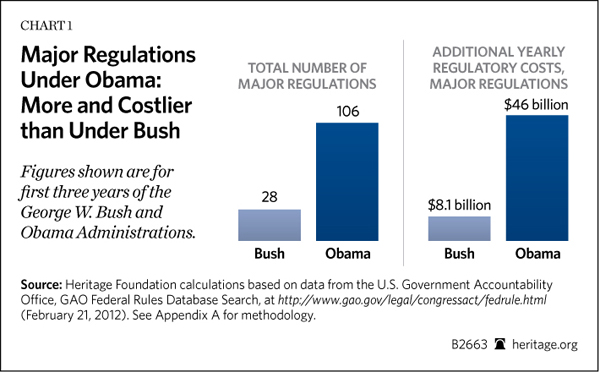Chart of the Week: Obama Tops Bush With More, Costlier Major Regulations
Alison Meyer /
President Obama famously declared in this year’s State of the Union: “I’ve approved fewer regulations in the first three years of my presidency than my Republican predecessor did in his.” Heritage’s James Gattuso and Diane Katz have run the numbers. And Obama shouldn’t be bragging.
Obama’s comparison encompassed all regulations, including federal rules for such things as Medicare rates, migratory birds and fireworks safety. And on that point, he was telling the truth.
This week’s chart tests Obama’s claim by looking at the number of major regulations imposed by each administration. Major regulations, as defined by the government, are regulations that cost up to $100 million or more each year.
In his first three years of presidency, President George W. Bush imposed 28 major regulations at a cost of $8.1 billion. Obama imposed 106 major regulations at a cost of $46 billion.
“This is almost four times the number—and more than five times the cost—of the major regulations issued by George W. Bush during his first three years,” according to the report.
Gattuso and Katz’s report, Red Tape Rising, documents how the Obama administration has greatly increased government regulations.
A few notable findings from the report:
- A majority of the major regulations came as a consequence of the Dodd-Frank financial regulation law, Obamacare and the EPA’s global warming crusade.
- The report used information given by the agencies that have no incentive to report accurately, so the costs estimated are understated, giving agencies the benefit of the doubt.
- More regulations are looming. Obamacare is imposing rules faster than the regulators can write them.
In order to help the economy and put a stop to regulations, Katz and Gattuso suggest three prongs of strong oversight: approval of new major regulations by Congress, a congressional Office of Regulatory Analysis, and sunset dates for existing regulations.
Katz spoke about the report at The Bloggers Briefing, which is available on Livestream and BlogTalkRadio.

